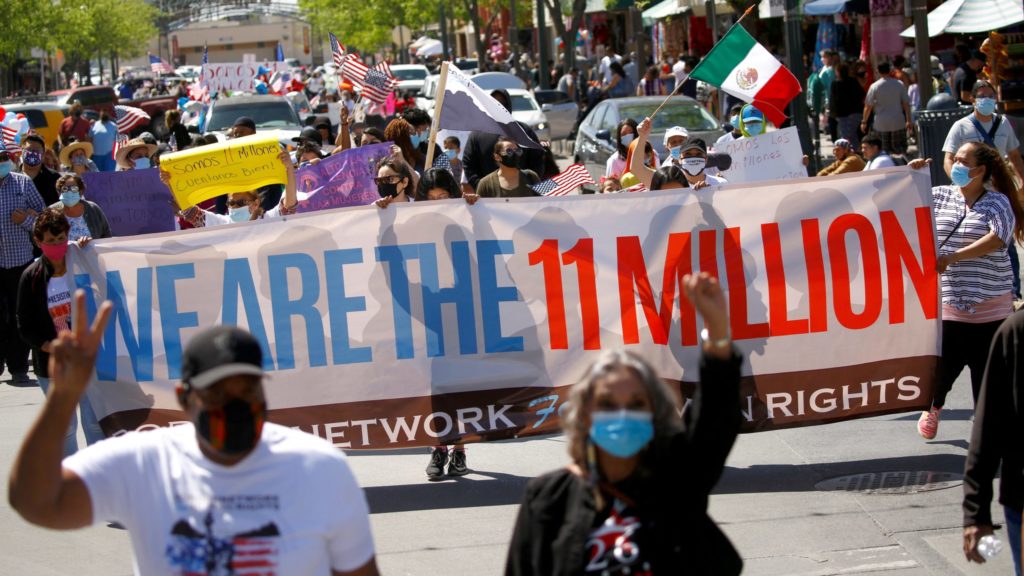The U.S. Supreme Court ruled June 23 that Texas and Louisiana lacked standing to sue the Biden administration over its deportation policies. With its 8-to-1 decision, the court revived immigration enforcement guidelines that prioritized the arrest and deportation of some unauthorized immigrants over others.
The challenged guidelines, issued in 2021 by the Department of Homeland Security, had set priorities about which unauthorized immigrants should be arrested, focusing on those who were considered security threats or recently entered the country.
Texas and Louisiana sued to block the DHS guidelines, arguing that they conflicted with federal immigration law, could allow immigrants with criminal records to remain free, and prevented immigration authorities from doing their jobs.
Immigration enforcement priorities have changed from one administration to the next. During former President Trump's administration, Border Patrol agents and immigration officers could prioritize the arrest and deportation of anyone living in the U.S. without legal authorization. These increased the number of deportations and, in some cases, caused targeting of migrants and massive raids at workplaces, according to Telemundo.
Biden reversed this course, and immigration authorities were asked to shift their focus to unauthorized migrants who commit violent crimes or have recently crossed the border.
DHS Secretary Alejandro Mayorkas said in a 2021 memo that there are about 11 million immigrants in the country without documentation, and the majority of them "have been contributing members of our communities for years." He noted the U.S. government does not have the capacity to apprehend and seek to remove all of them, which led to the recommendation to prioritize those who pose a threat to national security, public safety and border security, among other guidelines.??
Last June, a Texas-based federal judge blocked the use of the guidelines nationwide. A three-judge panel of the 5th U.S. Circuit Court of Appeals in New Orleans unanimously denied DHS's request to pause the ruling. The administration then asked the Supreme Court to block the ruling.
In July, the Supreme Court refused to restore the deportation guidelines by a 5-4 vote, while agreeing to hear arguments in November. The high court heard oral arguments that lasted more than two hours on Nov. 29.
Following the Supreme Court's ruling, the White House will again be able to follow its own guidelines for immigration enforcement.
On June 23, Justice Brett Kavanaugh wrote the majority opinion, clarifying that the high court did not address whether the administration was complying with immigration laws. It ruled only that Texas and Louisiana lacked standing to challenge the deportations policy.
"We take no position on whether the Executive Branch here is complying with its legal obligations," Kavanaugh wrote, explaining, "We hold only that the federal courts are not the proper forum to resolve this dispute."
"The States have brought an extraordinarily unusual lawsuit. They want a federal court to order the Executive Branch to alter its arrest policies so as to make more arrests. Federal courts have not traditionally entertained that kind of lawsuit; indeed, the States cite no precedent for a lawsuit like this," he wrote.
"If the court green-lighted this suit," wrote Kavanaugh, "we could anticipate complaints in future years about alleged Executive Branch under-enforcement of any similarly worded laws -- whether they be drug laws, gun laws, obstruction of justice laws or the like. We decline to start the federal judiciary down that uncharted path."
Joining Kavanaugh's majority opinion were Chief Justice John G. Roberts Jr., as well as Justices Sonia Sotomayor, Ketanji Brown Jackson and Elena Kagan. Justices Neil Gorsuch, Clarence Thomas and Amy Coney Barrett voted with the majority but did not agree with its reasoning. Justice Samuel Alito Jr. dissented, writing the majority had given too much power to the executive branch.
"The Court's answer today is that the Executive's policy choice prevails unless Congress, by withholding funds, refusing to confirm Presidential nominees, threatening impeachment and removal, etc., can win a test of strength," he wrote. "Relegating Congress to these disruptive measures radically alters the balance of power between Congress and the Executive, as well as the allocation of authority between the Congress that enacts a law and a later Congress that must go to war with the Executive if it wants that law to be enforced."
"This sweeping executive power endorsed by today's decision may at first be warmly received by champions of a strong Presidential power, but if presidents can expand their powers as far as they can manage in a test of strength with Congress, presumably Congress can cut executive power as much as it can manage by wielding the formidable weapons at its disposal," the justice added. "That is not what the Constitution envisions."
In a statement, Mayorkas said the administration welcomed the court's ruling.
"The Guidelines enable DHS to most effectively accomplish its law enforcement mission with the authorities and resources provided by Congress," he said.

